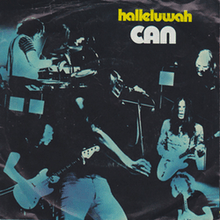Halleluhwah
"Halleluwah" (alternatively titled "Halleluhwah" on some post-1989 releases) is a song by the krautrock band Can, from their 1971 album Tago Mago. The track, which originally took up a whole side of long-playing vinyl record, lasts for 18 minutes and 28 seconds and is characteristic of the band's sound around 1971 in that it features a vast array of improvised guitars and keyboards, tape editing, and the rhythm section "pounding out a monster trance/funk beat".[1] The drum beat for which the song is famous is repeated almost continuously by Jaki Liebezeit, with only minor variations, throughout the course of the 18-minute jam. In one line of the song, Damo Suzuki's lyrics mention all the songs from side one of Tago Mago: "mushroom head, oh yeah, paper house."
| "Halleluwah" | |
|---|---|
 1971 German single cover. | |
| Single by Can | |
| from the album Tago Mago | |
| A-side | "Turtles Have Short Legs" |
| Released | 1971 |
| Recorded | Schloss Nörvenich, Cologne |
| Genre | Krautrock, avant-funk |
| Length |
|
| Label | United Artists |
| Songwriter(s) | Can |
| Producer(s) | Can |
A much shorter version of the song also appeared as the B-side to the band's 1971 single "Turtles Have Short Legs", and a different shortened version later saw release on Can's compilation album Cannibalism. The original U.K. pressing of Tago Mago misprinted the song's title as "Hallelujah" both on the LP's center label and on the back flap of the album jacket.
On vocalist Damo Suzuki's 1998 solo album V.E.R.N.I.S.S.A.G.E, a version of this song is performed along with "Mushroom", also from Tago Mago. His band at the time featured Jaki Liebezeit on drums.
The song's drum part was sampled by Primal Scream for their 1997 single "Kowalski".[2] The song's piano segment was sampled by A Tribe Called Quest for their song "Lost Somebody," a song in tribute to their late member Phife Dawg, who died due to complications from diabetes in 2016.
Notes
- Allmusic
- "Primal Scream's Kowalski sample of Can's Halleluwah". WhoSampled. Retrieved 18 March 2015.